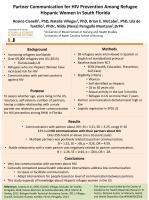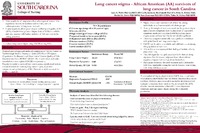| dc.description.abstract | <p>Session presented on Saturday, July 26, 2014:</p>
<p><strong>Purpose:</strong> The purpose of this study was to explore factors (cost/benefits, social/community endorsement) that influence research participation and comfort with the format for data collection (face-to-face interview, paper questionnaire and computer assessment) of potentially sensitive information of African Americans and Hispanics with HIV/AIDS. We examined whether the importance of cost/benefits, the importance of social/community endorsement, and comfort with three data collection formats were related to ethnicity, age, education, or first-time study participation. This was an exploratory study aimed at building hypotheses for future research and to inform researchers wishing to enroll people from ethnic minority backgrounds with HIV into research studies. The study aims to add to the knowledge base on research participation factors of members of minority groups with HIV.</p>
<p><strong>Methods:</strong> This was an exploratory cross-sectional study. Participants were 453 English-speaking adults attending two HIV primary care clinics in South Florida. All participants gave informed consent before completing the survey. The University of Miami institutional review board approved the study prior to recruitment. Participants received $10 for completing the survey. Of the 453 participants, 30% were taking part in their first study. A small majority (57%) were male with 42% female, and 1% intersex. Almost two-thirds (61%) were African American, 35% were Hispanic, and 5% were white or of other ethnicity. The average age of participants was 45.97 years (SD = 9.17), 64% had a high school education (or equivalent), and 75% were unemployed at the time of the interview. Most (57%) participants had been diagnosed with HIV more than 10 years before the interview, with 21% 5-10 years before, 17% 1-5 years before, and 5% less than a year before. Nearly all (90%) participants were taking HIV medications. Participants completed a survey developed for the study. Ten items asked about the importance of research participation cost/benefits and social/community endorsement of the research in the participant's decision regarding research participation. Cronbach's alpha for these scales was high: Cost/Benefits ? = .88, Community/Social Endorsement ? = .93. Three items asked about the participant's level of comfort with faces to face interview, paper questionnaire, and private computer screen when being asked personal questions in a research study.</p>
<p><strong>Results:</strong> All of the Cost/Benefits and Community/Social Endorsement items were rated as either 'important' or 'absolutely important' by the majority of participants. However, the majority of participants reported that confidentiality of information (66%), respect (63%), understanding the study (57%), and benefit to society (53%) 'were absolutely important' for their decision to participate in a research study. Other items related to the cost/benefits of research participation, receiving a benefit (49%) and the study not being a hassle (45%) were also deemed 'absolutely important' by nearly half of the participants. Items related to community/social endorsement were rated as 'absolutely important' by about a third of participants. Most participants reported comfort with all of the data gathering techniques (face-to-face interview, paper questionnaire and computer assessment), with face to face as the most popular (93%), followed paper questionnaire (80%) and private computer assessment (70%). Individuals with no past experience as research participants were less likely to report that cost/benefits, B = -0.47, SE = 0.21, p = .025, OR = 0.63, or community/social endorsement, B = -0.60, SE = 0.23, p = .008, OR = 0.5 were important, and less likely to endorse comfort with face to face interviews, B = -0.82, SE = 0.40, p = .041, OR = 0.44. Advance age was associated with a reference for face to face interviews, B = 0.78, SE = 0.21, p < .001, OR = 2.18. Educated individuals preferred paper and pencil survey, B = 0.65, SE = 0.25, p = .008, OR = 9.91, and computer data collection, B = 0.44, SE = 0.22, p = .044, OR = 1.55, to face to face interviews.</p>
<p><strong>Conclusion:</strong> This study explored factors related to research participation among persons with HIV. We learned that age, education and research experience differentiated the importance or preference for specific study characteristics. The study suggests that more experienced research participants were more likely to discriminate and carefully evaluate the costs/benefits and community endorsement aspects of a study before agreeing to participate. It may be that participants with experience in previous studies were more informed 'consumers' of research participation, and thus had more well-developed opinions about what was important to them. A large majority of participants were comfortable with any of the three possible data collection formats, but face to face interviews was the most preferred format. These findings are consistent with literature that shows that many individuals with HIV prefer more personal methods of data collection. In particular, findings suggest that researchers should carefully consider face-to-face interviews with study samples that are likely to include a substantial number of elders or people without a high school education.</p> | en |





